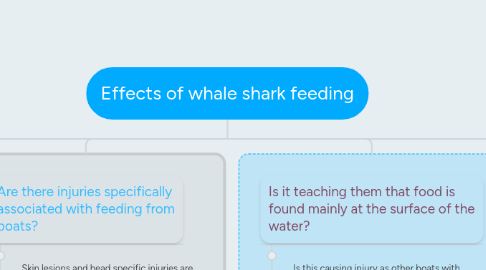
1. Are migratory patterns being effected by the feeding?
1.1. Does this effect the health of the whale sharks?
1.1.1. Long term studies have not been conducted on the subject but preliminary studies are pointing to a lowered reproduction rate, possibly due to higher body temperatures due to hotter sea water. This could lead to less babies being born and the population decreasing.
1.2. Studies are showing the whale sharks are staying in the Oslob area much longer than previously done. Often staying during the hot season when water temperatures rise to levels hotter than a whale shark would normally swim in.
2. Will feeding the whale sharks make them dependent on people for food?
2.1. is the food provided consistent with their natural diet?
2.1.1. no the food provided is not consistent with their natural diet and does not contain the necessary requirements for sustenance. Yet due to the ease of finding the food it is leading to the whale sharks staying to feed longer.
2.2. will they still feed naturally?
2.2.1. not enough long term studies have been conducted to scientifically verify this fact but preliminary research shows it is changing their natural feeding behaviour.
3. Will they loose natural wariness of people due to constant interaction?
3.1. Will this endanger them in non tourist areas found along natural migratory routes?
3.1.1. Yes this has been shown to cause harm when learned food seeking behaviour has led to close encounters with boats not accustomed to a whale bumping into it requesting food.
3.2. Not enough data has been collected long term to fully understand the ramifications although tourists are asked to stay a certain distance away from the whale sharks as they do have a natural wariness and tend to show signs of stress when in contact with humans. Yet the contact with the boat men who feed the whales is more of an issue as they are loosing the natural wariness towards boats which are a greater danger in areas where boats with propellers are more prevalent.
4. Will the whale sharks associate boats with food?
4.1. Could this be harmful to them in the future?
4.1.1. Are they being injured by boats with propellers due to food seeking behaviour?
4.1.1.1. Yes, documented injuries are found to be due to this food seeking behaviour.
4.1.2. This is already causing harm to them and may only get worse in the future
